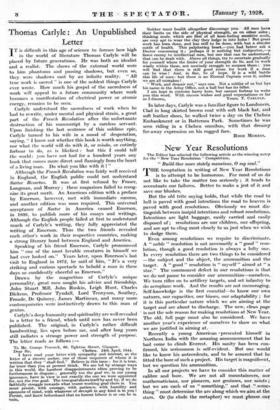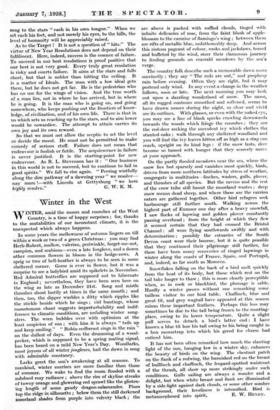New Year Resolutions
The Editor has selected the following article as the winning entry for the " New Year Resolution " Competition.
" Build thee more stately mansions, 0 my soul."
THE temptation in writing of New Year Resolutions is to attempt to be humorous. For most of us do not like to take the matter too seriously ; it tends to accentuate our failures. Better to make a jest of it and save our blushes.
But the old trite saying holds, that while the road to hell is paved with good intentions the road to heaven is paved with good resolutions. Obviously we must dis- tinguish between insipid intentions and robust resolutions. Intentions are light baggage, easily carried and easily disposed of ; resolutions are our children, our offspring, and are apt to cling most closely to us just when we -wish to dodge them.
Even among resolutions we require to discriminate. A " noble " resolution is not necessarily a " good " reso- lution, though a good resolution is always a lofty one. In every resolution there are two things to be considered —the subject and the object, the ammunition and the target. A " good " resolution is " myself " aimed at " -a star." The commonest defect in our resolutions is that we -do-not pause to consider our ammunition—ourselves. We turn rifles on to artillery targets, and set infantry to do aeroplane work. And the results are not encouraging. Self-knowledge is the first essential—to know our own natures, our capacities, our biases, our adaptability ; for it is this particular nature which we are aiming at the target and are about to discharge. The new, clean page is not the sole reason for making resolutions at New Year. The old, full page must also be considered. We have another year's experience of ourselves to show us what we are justified in aiming at.
Recently -a young American • presented himself in Northern India with the amazing announcement that he had come to climb Everest. His sanity has been con- firmed, his seriousness is self-evident. But one would like to know his antecedents, and to be assured that he fitted the bore of such a project. His target is magnificent, but we question his ammunition.
In all our projects we have to consider this matter of calibre and bore. We are not all mountaineers, nor mathematicians, nor pioneers, nor geniuses, nor saints ; but we are each of us " something," and that " some- thing " must determine the arc along which we aim at the stars.. Or (to elude the metaphor) we must _phrase our song to the stars " each in his own tongue." When we set each his feet, and not merely his eyes, to the hills, the level of humanity will be appreciably raised.
As to the Target It is not a question of " hits." The virtue of New Year Resolutions does not depend on their fulfilment. Here, indeed, success is the essence of failure. To succeed in our best resolutions is proof positive that our best is not very good. Every truly great resolution is risky and courts failure. It aims at the stars and falls short, but that is nobler than hitting the ceiling. It is a matter of Ideals. The man with a low ideal gets there, but he does not get far. He is the pedestrian who has no use for the wings of vision. And the true worth of a man lies, not in where he has arrived, but in where he is going. It is the man who is going on, and going somewhere, who keeps pushing out the frontiers of know- ledge, of civilization, and of his own life. There is that in us which sets us reaching up to the stars, and to aim lower would be cowardice. The attempt to attain carries its own joy and its own reward.
So that we must not allow the sceptic to set the level or decide the mood. He must not be permitted to make Comedy of serious stuff. Failure does not mean that endeavour is foolish or futile. The aCquiescence in failure is never justified. It is the starting-point for new endeavour. As R. L. Stevenson has it : " Our business in this world is not to succeed, but to continue to fail in good spirits." We fall to rise again. " Peering wistfully along the dim pathway of a dawning year " we resolve— nay more !—with Lincoln at Gettysburg " we here







































 Previous page
Previous page